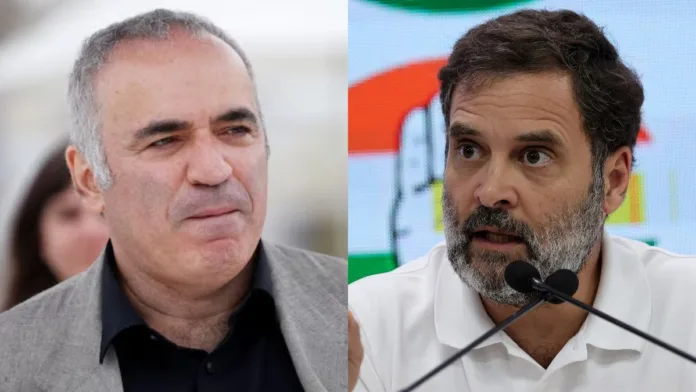World Chess Champion Garry Kasparov recently made headlines with his subtle yet significant commentary on Congress MP Rahul Gandhi’s decision to contest from two Lok Sabha seats, Raebareli and Wayanad. Garry Kasparov, known for his strategic prowess on the chessboard, offered a thought-provoking perspective, suggesting that Gandhi should secure victory in Raebareli before aiming for higher political aspirations.
In response to a tweet by a user expressing relief that Garry Kasparov and Grandmaster Vishwanathan Anand retired before facing the purported “greatest chess genius of our times,” Kasparov humorously remarked, “Traditional dictates that you should first win from Raebareli before challenging for the top!”
This remark, while seemingly light-hearted, underscores the significance of establishing a strong foothold in one’s political base before expanding ambitions on a broader scale. Kasparov’s analogy between electoral politics and chess strategy adds depth to the discourse surrounding Gandhi’s electoral choices.
Insights from Garry Kasparov’s Commentary
Kasparov’s commentary gains significance within the broader context of Indian politics, particularly amidst Rahul Gandhi’s decision to contest from Raebareli, a constituency with historical significance for the Gandhi family. The move, announced by the Congress party, aims to fortify their position in traditional strongholds while simultaneously expanding their electoral footprint.
Jairam Ramesh, a prominent Congress leader, hailed Gandhi’s candidacy from Raebareli as a strategic masterstroke, capable of confounding rival political parties. Ramesh emphasized Gandhi’s astuteness in both political maneuvering and strategic thinking, drawing parallels between politics and the intricate game of chess.
Rahul Gandhi’s Electoral Strategy

Rahul Gandhi’s decision to contest from Raebareli and Wayanad underscores his commitment to representing diverse constituencies and broadening the party’s appeal across regions. By simultaneously contesting from these constituencies, Gandhi aims to leverage his political capital and connect with voters across different demographic segments.
His candidature from Raebareli, a seat previously held by his mother and former Congress President Sonia Gandhi, symbolizes a continuation of the family’s legacy in Indian politics. Additionally, Gandhi’s bid for the Wayanad seat reflects a strategic move to strengthen the party’s presence in southern India.
Garry Kasparov‘s astute observation on Rahul Gandhi’s electoral strategy adds a unique dimension to the ongoing political discourse. By invoking the analogy of chess, Kasparov emphasizes the importance of consolidating one’s position before pursuing ambitious objectives, echoing timeless principles of strategy and foresight.
As the electoral saga unfolds, Rahul Gandhi’s dual candidacy from Raebareli and Wayanad will undoubtedly remain a subject of intense scrutiny and speculation. In this high-stakes political game, Garry Kasparov‘s words serve as a reminder of the intricate interplay between strategy, ambition, and the quest for electoral success.





